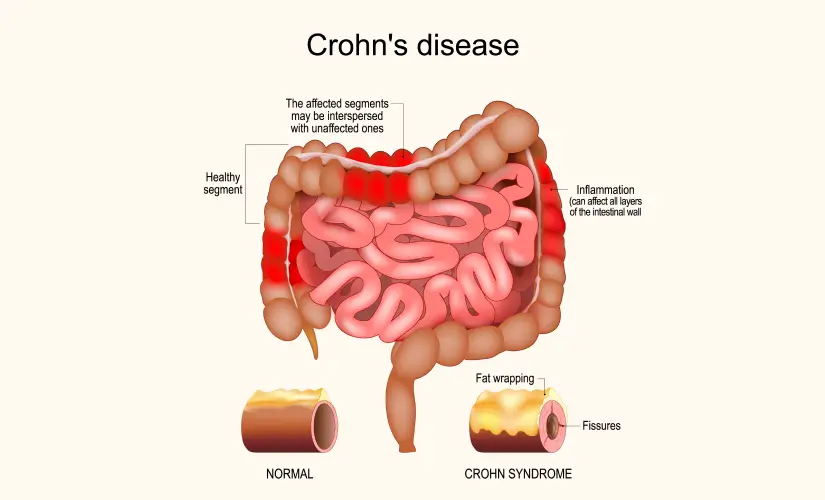-
Doctors
-
Specialities & Treatments
Centre of Excellence
Specialties
Treatments and Procedures
Hospitals & Directions HyderabadCARE Hospitals, Banjara Hills CARE Outpatient Centre, Banjara Hills CARE Hospitals, HITEC City CARE Hospitals, Nampally Gurunanak CARE Hospitals, Musheerabad CARE Hospitals Outpatient Centre, HITEC City CARE Hospitals, Malakpet
HyderabadCARE Hospitals, Banjara Hills CARE Outpatient Centre, Banjara Hills CARE Hospitals, HITEC City CARE Hospitals, Nampally Gurunanak CARE Hospitals, Musheerabad CARE Hospitals Outpatient Centre, HITEC City CARE Hospitals, Malakpet Raipur
Raipur
 Bhubaneswar
Bhubaneswar Visakhapatnam
Visakhapatnam
 Nagpur
Nagpur
 Indore
Indore
 Chh. Sambhajinagar
Chh. SambhajinagarClinics & Medical Centers
Book an AppointmentContact Us
Online Lab Reports
Book an Appointment
Consult Super-Specialist Doctors at CARE Hospitals

Crohn's Disease
Symptom, Causes, Diagnosis and Treatment
Crohn's Disease
Crohn's disease affects millions of people worldwide and poses a major health challenge nationwide. This chronic condition inflames the digestive tract and disrupts the daily lives of diagnosed patients.
Patients can experience problems anywhere in their digestive system, from the mouth to the anus, which creates unique challenges. The disease's impact is substantial - many patients need hospital care each year, and half undergo surgery within a decade. Patients with Crohn's in their colon have a higher risk of developing colon cancer.
Smokers double their chances of getting this digestive disorder. The disease brings other health complications too, as one-third of patients develop anaemia. Treatment focuses on reducing inflammation, stopping symptom flares, and helping patients stay in remission. This article will cover everything about this disease. It will include its causes and ways to treat and manage it.

What is Crohn's Disease?
Crohn's disease is a chronic condition that inflames your digestive tract. Doctors classify it as an inflammatory bowel disease (IBD). Crohn's stands apart from other digestive problems because it can affect any part of your digestive system, from the mouth to the anus. The small intestine and the beginning of the large intestine are the most commonly affected areas.
Symptoms of Crohn's Disease
Living with a chronic intestinal condition can overwhelm you. Your ability to manage the disease improves when you understand your body's mechanisms. During a Crohn's flare-up, you might experience:
- Persistent diarrhoea
- Abdominal pain and cramps
- Rectal bleeding
- Urgent need to move bowels
- Fatigue and low energy
- Weight loss
Crohn's effects extend beyond your gut. The disease can cause joint pain, eye inflammation, skin problems, and mouth sores. Children with this condition might experience delayed growth or puberty.
Crohn's Disease Causes
Doctors haven't pinpointed the exact trigger for Crohn's, but several factors contribute to its development. Your immune system might attack healthy bacteria in your intestines, which leads to inflammation. Genetics also play a role since Crohn's often shows up in families and raises the chance of getting it when there is a family history. Things like diet, smoking, stress and infections can make symptoms worse or lead to flare-ups. Experts also believe that uneven gut bacteria levels may have an influence on how the disease develops.
Risk Factors of Crohn's Disease
Your risk of developing Crohn's increases if you:
- Are between 20-29 years old
- Have family members with IBD
- Have Jewish ancestry
- Smoke cigarettes (doubles your risk)
- Have a habit of eating too much refined sugar, fat, and processed food.
Complications of Crohn's Disease
Untreated Crohn's can cause severe problems like:
- Strictures (narrowed intestines)
- Fistulas (abnormal tunnels between organs)
- Bowel obstructions
- Malnutrition
- Fistulas
Diagnosis for Crohn's Disease
Medical history and physical assessment: Your doctor will ask questions about your symptoms & bowel habits. They will inquire about your family history of the same disease. Your doctor also checks for abdominal tenderness and swelling.
Doctors use multiple tests to confirm Crohn's:
- Blood tests detect inflammation and anaemia
- Stool studies reveal blood or infection
- Colonoscopy examines your colon
- CT scans or MRI provide detailed images
Crohn's Disease Treatment
Doctors have not found a cure for Crohn's disease yet, but treatments can manage symptoms, lower flare-ups, and keep remission going over time. These include:
- Medications:
- Anti-inflammatory medicines to lower gut inflammation
- Immune system suppressors to calm the overactive immune system
- Antibiotics for infection treatment
- Anti-diarrheal medicines for diarrhoea
- Lifestyle & Diet Changes: You can lessen flare-ups by:
- Eating smaller, frequent meals
- Cutting out foods that cause trouble, like spicy or fatty dishes and high-fibre items
- Drinking enough water
- Stopping smoking
- Managing stress
- Staying active
- Nutritional Therapy: To balance the nutritional needs
- Surgery: Doctors recommend surgical intervention to treat:
- Intestinal strictures
- Fistula
- Severe intestinal bleeding
- When medications no longer work
When to See a Doctor
You should contact your doctor right away if you notice:
- Severe abdominal pain
- Bloody bowel movements
- Unexplained fever
- Weight loss
These symptoms might indicate serious complications that need immediate medical attention.
Conclusion
Crohn's disease can be challenging for many patients. This gut condition affects everyone differently, but learning about it can make handling symptoms easier. Doctors can suggest several treatment options to reduce inflammation and prevent flare-ups. Finding the right treatment might take time.
Getting diagnosed early guides to better outcomes. Treatment approaches keep improving with medical advances, which brings hope to newly diagnosed patients. Many people live meaningful lives through careful management, despite Crohn's being chronic.
Your healthcare team plays a vital role in managing your condition. Getting regular check-ups helps keep track of your health and lets doctors change treatments if necessary.
Life with Crohn's definitely brings unexpected moments. With proper medical help, lifestyle adjustments, and support many people learn to
cope and even flourish. The goal lies in handling symptoms while still enjoying the parts of life that matter most outside the illness.
FAQs
1. Is Crohn's curable?
Medical science hasn't found a cure for Crohn's disease yet. The right treatments can reduce the inflammation that causes symptoms. Most patients lead active, fulfilling lives with proper medical care. The goal of treatment is remission - a period without signs or symptoms. About half the patients need surgery at some point, though it doesn't cure the condition. The disease tends to return, usually near the reconnected tissue.
2. How did you know you had Crohn's?
Most people notice symptoms that last several days. The first signs usually include stomach pain, different bowel habits, tiredness, and dropping weight. Blood shows up in the stools or during bowel movements. Some patients develop mouth sores and anal tears. These signs might come and go. Doctors need to run blood tests, stool tests, endoscopy, or colonoscopy to confirm the diagnosis.
3. What time of day is Crohn's worse?
Eating certain foods or feeling stressed can trigger Crohn's symptoms. Each person experiences the condition differently. Some have mild symptoms while others face more serious health problems.
4. What is the difference between Crohn's disease and ulcerative colitis?
These inflammatory bowel diseases share some traits but differ in important ways:
- Location: Ulcerative colitis stays in the colon, while Crohn's can appear anywhere from the mouth to the anus
- Pattern: Crohn's creates scattered inflammation with healthy spots between, but colitis causes continuous inflammation
- Depth: Crohn's inflammation goes through all bowel wall layers, while colitis only reaches the inner lining.
To Book an Appointment, call:
Still Have a Question?


